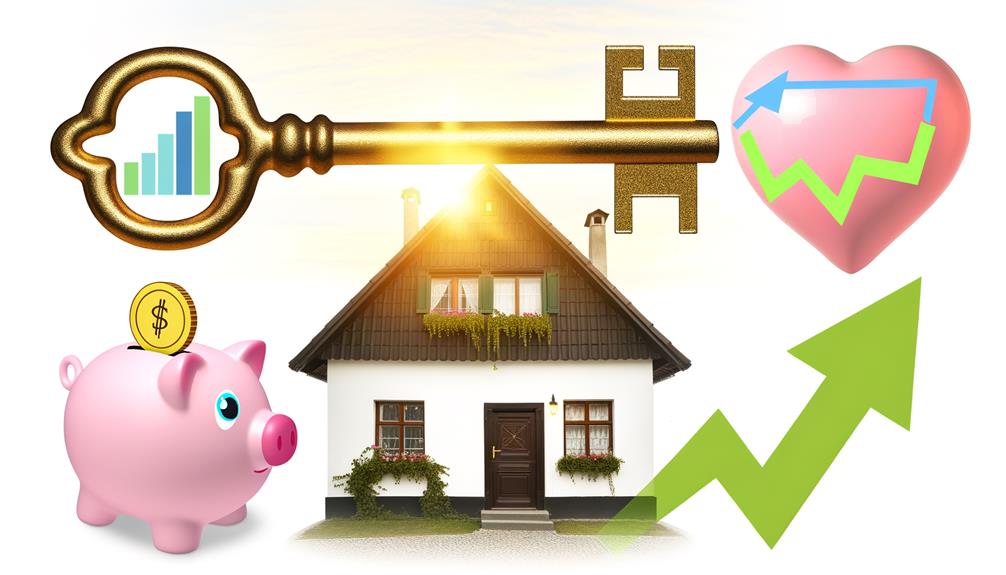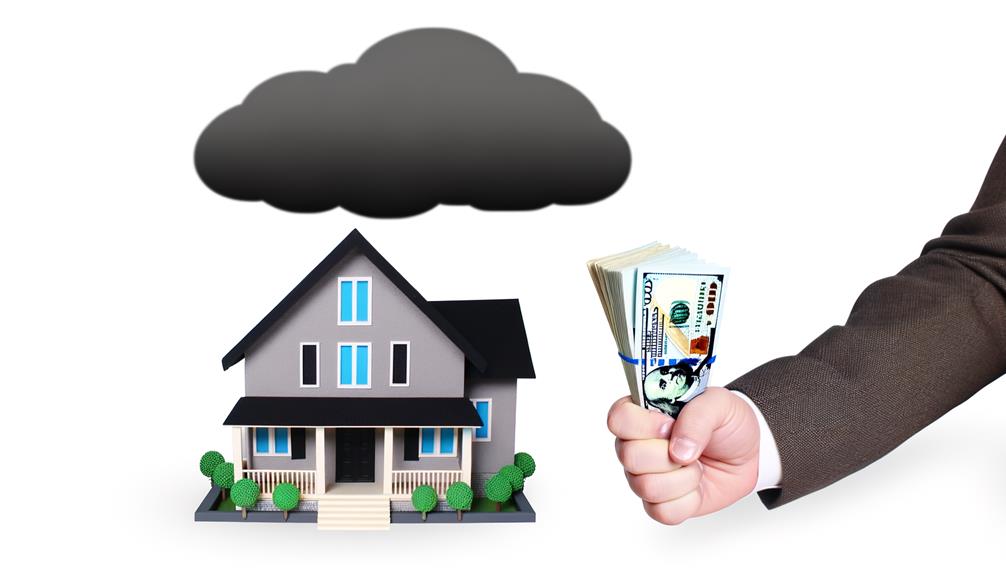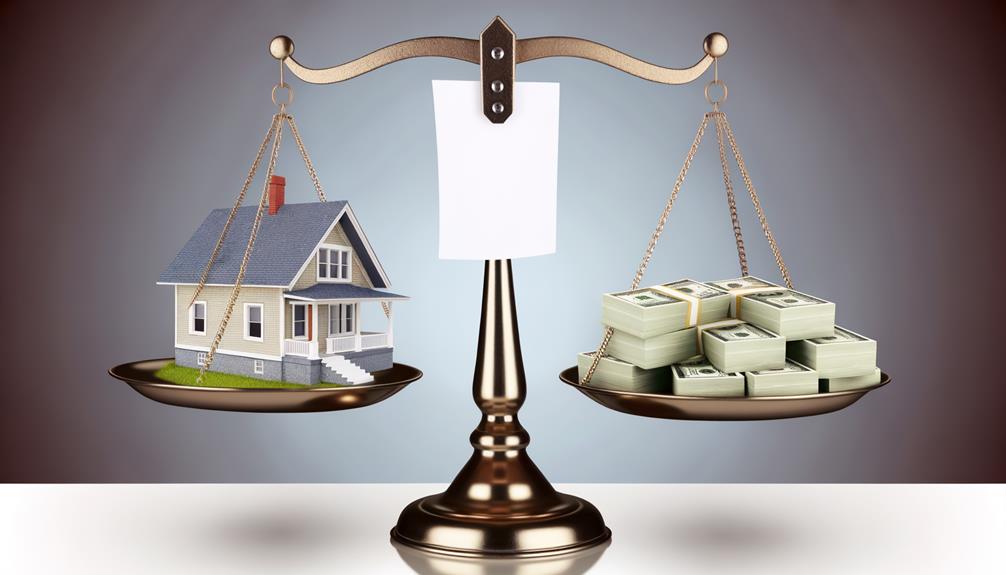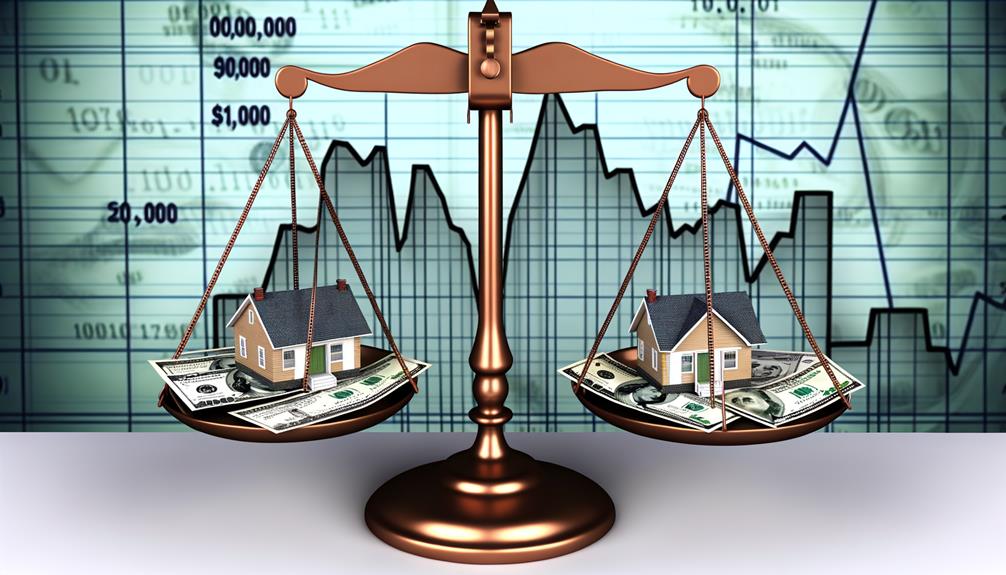The complex decision to either pay cash for a house or opt for financing is one that stands central to personal finance, shaping your financial trajectory for years, if not decades to come.
A cash purchase can provide the ease of a swift transaction, devoid of interest or a looming debt, while financing can offer flexibility and potential tax benefits.
However, these broad strokes barely scratch the surface of this intricate decision-making process.
Let us embark on an exploration of the comparative advantages and potential drawbacks of both routes, to arm you with the knowledge to make an informed choice that aligns with your unique financial landscape and long-term objectives.
Key Takeaways
- Cash payments for a house offer immediate ownership benefits and potential for negotiation, resulting in lower purchase prices.
- Financing a house through a mortgage allows for spreading the cost over a number of years, making it more accessible and less financially draining in the short term.
- Cash payments provide a competitive edge in the home purchase process, resulting in quicker and more certain transactions with reduced time to close and elimination of loan denial risks.
- Financing a house through a mortgage offers substantial tax benefits, such as mortgage interest deductions, and the potential for savings from lower interest rates.
Understanding Cash Vs. Mortgage
Delving into the intricate details of purchasing a house, it's crucial to understand the fundamental differences and implications of buying with cash versus obtaining a mortgage. Two primary methods are prevalent: using cash to buy a home or opting for a mortgage.
The choice to pay cash for a house offers immediate homeownership, bypassing the need for mortgage payments. The transaction can be expedited, avoiding the loan approval process and associated paperwork. However, the cons of paying cash can be significant, including the potential depletion of cash reserves and loss of investment opportunities.
On the other hand, choosing a mortgage preserves cash for other investments or emergencies. It provides access to tax benefits, including mortgage interest payments deductions. Yet, it necessitates long-term monthly payments and incurs interest costs.
Weighing the pros and cons of both methods is essential. The decision should be guided by your current financial situation, long-term goals, and real estate market conditions.
In understanding cash vs. mortgage, it's about finding a balance that matches your needs and aspirations for a sense of belonging and ownership.
Advantages of Cash Payments
Purchasing a house with cash has significant advantages, key among them being immediate ownership benefits. In contrast to financing, cash payments provide potential for instantaneous transfer of property rights, eliminating the waiting period associated with loan approval.
Furthermore, cash offers may incentivize sellers to negotiate, expediting the sale process and potentially reducing the overall purchase price.
Immediate Ownership Benefits
When one opts for paying cash for a house, they are privy to a plethora of immediate ownership benefits, a significant one being the elimination of mortgage application and its associated paperwork. This offers a sense of financial security, rooting from the fact that the home is fully paid off, translating to zero monthly mortgage payments. This, in turn, allows homeowners to avoid interest payments that would have accumulated over the loan term, saving a substantial amount.
Additionally, paying cash for a house allows homeowners to gain a competitive edge in the home purchase process, with the potential to negotiate a better price. By eliminating the need for a mortgage, buyers can present themselves as more attractive candidates to sellers who may prefer a quick and hassle-free transaction.
Furthermore, choosing to pay cash for a house expedites the closing process, reducing it to as little as a week. Without the need for mortgage approval and the associated waiting period, buyers can quickly seal the deal and move into their new home.
Potential Seller Incentives
In the realm of real estate transactions, the allure of cash purchases often presents prospective sellers with enticing incentives, making such offers particularly attractive.
The potential seller incentives of an all-cash offer are numerous. The cash buyer might present a quicker, more certain transaction, reducing the time to close and eliminating the risk of loan denial. This swiftness, often culminating in a cash home purchase within a week, is especially appealing in a volatile real estate market.
Furthermore, paying in cash can lead to significant savings for the buyer, who may negotiate a lower sales price, thus creating a win-win situation for both parties.
The Mortgage Route Benefits

Despite the clear advantages of cash purchases, opting for a mortgage also presents a number of notable benefits.
Firstly, the use of a mortgage gives potential homeowners a chance to spread the cost of a house over a number of years. This option makes home ownership more accessible and less financially draining in the short term. Monthly mortgage payments could also be lower than paying rent, providing an opportunity for savings.
Secondly, having a mortgage can offer substantial tax benefits. The mortgage interest deduction, for example, could reduce your taxable income and potentially save you thousands of dollars.
Thirdly, the current low Mortgage Rates make it an opportune time to consider a home loan. Although you'll need to pay mortgage origination fees, they are often outweighed by the potential savings from a lower interest rate.
It's important to note that getting approved for a mortgage can depend on several factors including credit score, income, and debt levels. It's wise to shop around and compare offers from various mortgage lenders to ensure you get the best deal possible.
Impact of Homestead Exemption
Often overlooked, the homestead exemption carries significant implications for homeowners, particularly in scenarios involving bankruptcy or forced sale of the property. This exemption can protect a significant portion of your home's equity from creditors. The impact of this safeguard is often a crucial factor to consider when deciding between paying cash for a house or securing a mortgage loan.
When buying a house, it's essential to consult a financial advisor. They can assess your overall financial situation and advise on the benefits of paying for a house in cash versus financing, considering factors like the homestead exemption, homeowners insurance, and property taxes.
The homestead exemption varies by state, but typically, it offers protection up to a certain dollar amount or a percentage of the home's value. Qualifications include using the property as the primary residence. This exemption can provide peace of mind and a sense of financial security for homeowners facing unexpected financial challenges.
Understanding the homestead exemption laws in your state is a critical component of sound financial planning and decision-making around homeownership. It's an aspect that underscores the importance of a comprehensive evaluation of your financial situation before purchasing a home.
Foreclosure Risks Without Mortgage

While understanding the protection offered by the homestead exemption is fundamental, it is equally critical to assess the potential foreclosure risks that can arise when a property is purchased outright without a mortgage. Using cash to pay for a house can provide peace of mind, but it's important to consider the potential complications.
- Property taxes and homeowner association fees: When you buy a house with cash, the responsibility for ongoing costs falls squarely on your shoulders. Failure to pay these necessary expenses can lead to foreclosure risks without a mortgage.
- Economic downturns: If you use all your resources making a cash purchase, you may lack the financial flexibility to weather unexpected financial storms, making your home vulnerable.
- Insurance: Without a lender's oversight, maintaining adequate insurance coverage becomes your responsibility. Failure to do so can lead to foreclosure if significant damage occurs.
In the 'House With Cash vs Finance' decision, understanding these risks is crucial. Cash offers may seem attractive, but they also come with responsibilities. Make sure you're prepared to handle these before you decide to buy a home with cash.
Purchasing Ease With Cash
Opting for a cash payment when purchasing a house offers certain benefits; however, it also carries potential drawbacks.
On the positive side, paying in cash can streamline the process, eliminate mortgage interest, and potentially reduce the purchase price.
However, it requires a significant upfront expenditure.
This section will explore these aspects, providing a comprehensive analysis of 'Purchasing Ease With Cash' in comparison to financing options.
Benefits of Cash Payment
In the realm of real estate transactions, the benefits of cash payment are manifold, with purchasing ease being one of the most significant advantages.
- Competitive Edge: Cash means a solid proof of funds, giving you a leg up in a competitive market. Sellers are more likely to favor buyers who can pay for a home outright.
- Speedy Transactions: With enough cash at hand, home purchases can close faster. Financing often prolongs the closing process, while cash expedites it.
- Earnest Money: Cash buyers can make an earnest money deposit immediately, demonstrating their serious intent.
Opting for cash payment for a home is a smart financial move that can simplify transactions, quicken the buying process, and establish a sense of trust and reliability with sellers.
Potential Cash Buying Drawbacks
Despite the allure of ease and speed in cash transactions, potential drawbacks should be thoughtfully considered as they can significantly impact financial flexibility and investment opportunities.
While it's true that buying a house with cash can simplify the process and favor cash buyers, this approach may not align with long-term financial goals. The National Association of Realtors suggests considering the potential cash buying drawbacks before making an offer on a house.
A significant cash buy could limit one's ability to invest the money elsewhere, possibly yielding higher returns. Additionally, having a large amount of money tied up in real estate could prove challenging if quick liquidity is needed.
Thus, potential buyers should consult with a real estate agent to explore all options.
Cash Vs Financing Debate
When considering the cash versus financing debate for purchasing a house, the advantage of cash purchases often lies in the simplicity and speed of the transaction. Making an all-cash offer can expedite the buying process, making it a particularly appealing option when looking to secure an investment property.
The cash vs financing debate brings three key financial topics to light:
- Cash purchases eliminate mortgage debt and interest rates, freeing up a significant amount of money in the long term.
- However, tying up a large portion of your finances in a house can leave you with a depleted emergency fund.
- Financing, while involving interest and additional costs, can provide financial flexibility and potential tax benefits.
Deciding whether you should pay cash for a house or finance depends on your personal financial situation and goals.
Credit Score and Cash Purchases
One significant aspect to consider is how a cash purchase of a house impacts your credit score. When buying a home with cash, you eliminate the need for a mortgage. This means there is no inquiry from a financial institution, which could potentially lower your credit score.
However, it's important to note that having a mortgage and making regular payments can actually improve your credit score. A mortgage is a type of installment loan, and responsibly managing it can demonstrate creditworthiness. By opting for a cash-out refinance, you leverage your home's equity while potentially boosting your credit score.
While cash purchases can provide the benefit of a potentially lower purchase price and eliminate the need for a mortgage calculator, they may not offer opportunities for credit score enhancement. This can impact personal finance decisions down the line.
Moreover, the home prices and the amount of earnest money deposit can also influence the decision to pay cash or finance. Therefore, it's crucial to consider the potential effects on your credit score when deciding between taking out a mortgage or making a cash purchase.
Cash Vs. Mortgage: a Comparison

In evaluating the choice between paying cash for a house or financing it with a mortgage, several key factors must be considered to align the decision with one's current financial status, long-term financial goals, prevailing interest rates, and personal risk tolerance.
The 'cash vs. mortgage: a comparison' essentially boils down to these points:
- Paying cash allows immediate ownership and eliminates the need for a mortgage application and subsequent monthly payments. It also means avoiding lenders title insurance and can give you an advantage in a competitive bidding situation.
- Getting a mortgage doesn't mean you cannot afford a new home. It can be a strategic choice to free up cash for other investments or expenses. Plus, the Best Mortgage terms can offer potential tax benefits.
- The cons of buying with cash include tying up a significant amount of money in one asset and potentially missing out on the credit-building benefits of mortgage repayments.
Whether you should pay cash for a house or finance depends on your individual circumstances. Consider your financial status, future plans, and risk tolerance before making this significant decision.
Deciding What's Right for You
Navigating the decision between a cash purchase and a mortgage financing for a house requires a thorough understanding of your financial standing, future goals, and risk tolerance, each of which can significantly influence your choice. To make the right call, assess your financial resources and commitments.
If you have a surplus of cash, paying outright might be feasible. However, consider your need for liquidity, as tying up capital in real estate could limit your ability to address unexpected expenses or investment opportunities.
Purchasing a house with cash can offer advantages, such as avoiding interest and expediting the buying process. It can also make your offer more attractive to sellers, but make sure to still conduct necessary inspections.
Conversely, financing provides flexibility, allowing you to use your money for other purposes or investments. Though a mortgage involves paying interest over the loan's life, it might be beneficial if you anticipate a higher return from other investments. However, it carries a real risk of foreclosure if repayments are not made.
Ultimately, the choice between cash and financing should align with your long-term financial goals and risk tolerance. Remember, the right choice for you is one that offers a balance between financial security and growth.
The Bottom Line: Cash or Mortgage?

Having weighed the benefits and drawbacks of cash purchase versus mortgage financing, it's crucial to distill this analysis into a definitive choice: cash or mortgage?
- Use Primary Sources: In a hot housing market, cash buyers have a competitive edge. Sellers prefer cash offers as they often lead to faster closing. However, it's essential to consider how much house you can afford without depleting your savings.
- Consider Lender-related Costs: Buying a home without a mortgage eliminates lender-related closing costs and interest, freeing up money instead for other uses. Yet, financing a home could be a good idea if you qualify for a low-interest rate, allowing you to invest your cash in higher-yield assets.
- Weigh Your Options: The choice between a loan or home purchase for cash comes down to your financial situation, long-term goals, and risk tolerance.
Frequently Asked Questions
Is It Better to Finance or Pay in Cash?
The decision between financing or paying cash depends on factors like credit score, interest rates, homeownership costs, financial security, investment opportunities, emergency fund, cash flow, personal preferences, market conditions, and down payment capabilities.
Is It Ever a Good Idea to Pay Cash for a House?
Paying cash for a house can offer financial security and debt avoidance, but it may lead to liquidity issues, limiting emergency funds and investment opportunities. Considering market volatility, tax implications, and opportunity costs is crucial.
How Much Less Should You Offer on a House When Paying Cash?
Cash discounts and negotiation tactics can influence a seller's preference towards cash offers. Market trends and property value also impact a cash buyer's advantage, potentially enhancing purchase power and long-term investment strategies.
Is It Better to Have Cash or Own Property?
Deciding between cash liquidity and property ownership involves balancing factors like investment diversification, housing market trends, real estate risks, and property maintenance costs alongside potential rental income, financial security and tax implications.
Conclusion
In conclusion, the choice between a cash payment and a mortgage for a house purchase is multifaceted. It depends on individual financial circumstances, long-term plans, and comfort with debt.
Interestingly, a National Association of Realtors report revealed that 23% of homebuyers paid cash in 2020.
Ultimately, both options have their advantages and potential drawbacks, making it essential for potential homeowners to carefully analyze their financial capabilities and objectives before making a decision.


